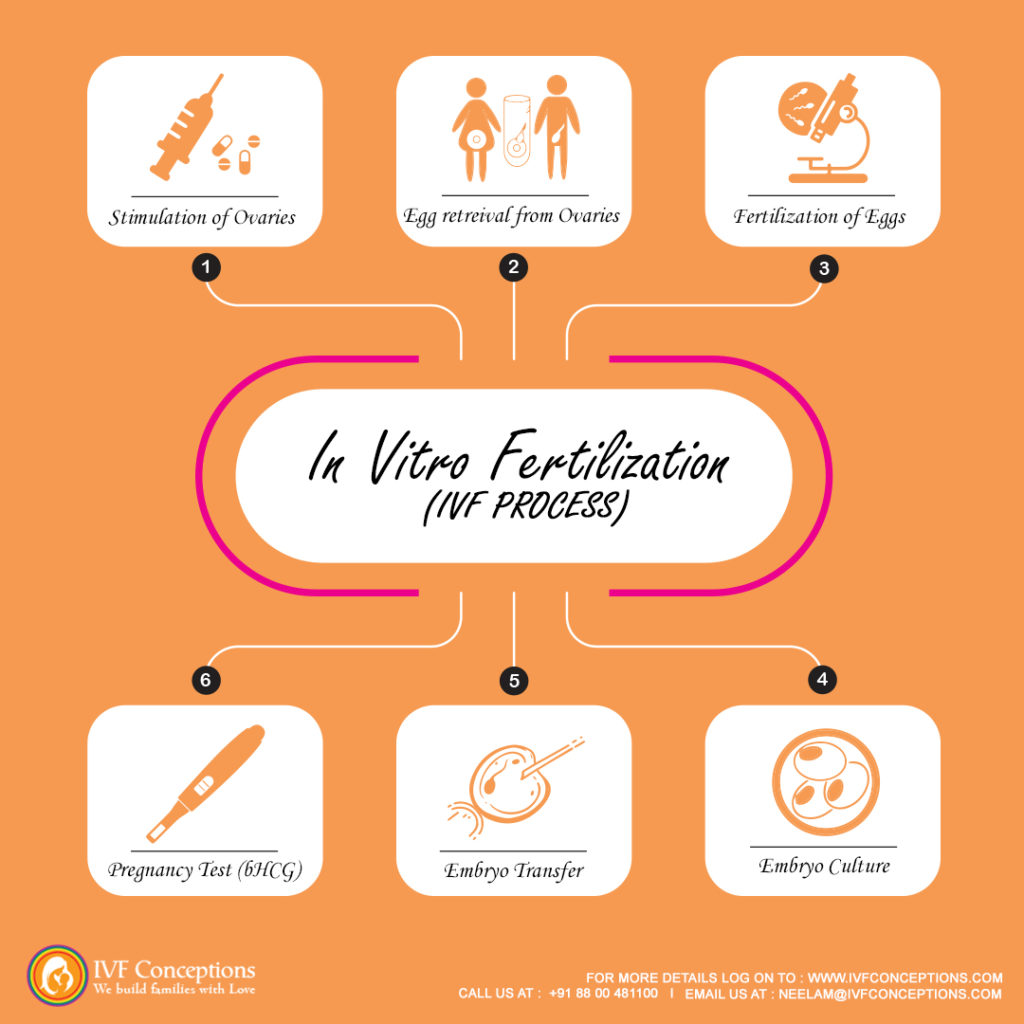Things to know before going for IVF: Prepare yourself for Success

IVF stands for In Vitro Fertilisation. IVF means when a baby is conceived outside the womb, in the test tubes in a lab-like condition and then it is planted in the uterus of the mother. Hence, it is sometimes also known as a test-tube baby as well. Not every couple needs IVF treatment.
The treatment is meant for those who are facing infertility. Infertility is the most common and tragic phenomenon among couples these days. Around one in seven couples in the US is infertile. So, before going for an IVF procedure, parents need to prepare themselves for long and tedious infertility treatment.
Embarking on the journey of In Vitro Fertilization (IVF) can be both exciting and challenging. As you consider starting IVF in California, there are crucial aspects to understand to make informed decisions. In this comprehensive guide, we delve into the key things you should know before beginning your IVF journey, providing valuable insights and expert advice.
Things to know before going for IVF
#1. How common is the IVF procedure?
As mentioned earlier, one in seven couples in the US faces infertility. Infertility can be both because of a man and a woman and also because of both. In around 80% of cases, either man or woman is infertile while in 20% of cases, both are infertile. So, they need to look for measures to become fertile. This is done with the help of an IVF procedure where the egg and sperm are mixed outside the body (in test tubes) and then the embryo is planted in the woman’s womb.
Also, not only couples, IVF procedure can be adopted by gay parents or single parents to have a child of their own. So, owing to the huge demand for IVF treatment, one in fifty babies is born due to IVF technology.
More resources for infertility treatments:
Cause of infertility in female
How to improve the IVF success rate?

#2. What is the correct age for going through an IVF treatment?
The younger you are, the better. IVF treatment is generally successful in the woman who is below the age of 35 years. With the advancement in age, the quality and quantity of the egg get reduced. Not only women but men also face some issues regarding sperm count and quality.
However, a man is more stable than a woman in this case. Hence, the quality and quantity of the sperm get less damaged in men of older age as compared to the egg quality and quantity of women. So, if you are in your 40s and someone else is in your 30s, chances of success are higher in the case of the other woman who is in her 30s.
More resources for infertility treatments:
Things to know before going for IVF
Tips for Overcoming Failed IVF Cycles and Finding Hope
IVF Process- What Parents Should Know For High IVF Success Rate.
Infographic: How Does IVF Process Work?
#3. How do you prepare for your IVF journey?
IVF journey involves collecting the egg from the woman and sperm from the man and fertilizing them outside the body of the parents and then planting the embryo in the uterus of the mother. So, this would require the collection of the egg. For this purpose, the woman’s body is stimulated to collect more eggs from her. So, this would require a few weeks to be completed.
So, you have to visit the clinic for check-ups and scans before the collection of an egg. After the collection of eggs, which usually takes just one hour, the couple has to visit the clinic for fertilization purposes and embryo transfer. After that, you have to go through tests for the pregnancy. So, it would generally take around 5 weeks.
#4. The procedure of IVF treatment
The full procedure of IVF is done in seven stages. These stages are –
- Day one of your menstrual cycle – Your nurse will help you to identify the day one of your cycles
- Stimulating the ovaries – The stimulus process starts with day 2. The ovaries usually produce 1 egg in a regular monthly period. For 8-14 days you will be taking medication to stimulate the follicles in your ovaries to create more eggs
- Egg retrieval – Egg retrieval, is a hospital day operation in which egg is collected from your body. You will be unconscious for the procedure, and it takes between 20-30 minutes to complete it.
- Sperm collection – If the man is using his own sperm, then a fresh sperm sample will be collected on the egg retrieval day in the morning. Otherwise, the frozen sperm sample of the donor sperm will be already present in the lab.
- Fertilisation- The eggs must be quickly fertilized. The eggs and a few sperms are put in a Petri plate to encourage fertilization in a controlled environment.
- Embryo formation – Once the sperm fertilizes the egg, it becomes an embryo. Day 5 embryo is known as a blastocyst and is used more commonly nowadays as it gives a better success rate and also reduces the chances of multiple pregnancies. Most infertility experts transfer one embryo to avoid multiple births.
- Embryo transfer – Once an embryo is formed in the lab, it will then be transferred to your body. Your nurse will inform you how to prepare for this procedure. It would be a five-minute procedure and you will be awake during the procedure.
#5. The hidden cost in the treatment of IVF
Generally, IVF is not an expensive procedure. But the cost of the IVF will depend on the various factors including your fertility health, rounds of IVF required, and the place where you are getting the procedure done. People often mistake the cycle cost as the full cost of the treatment.
One should be aware of the fact that cycle cost includes only egg collection, embryo transfer, scans, and embryology. There is an extra cost for the tests and medications. So, you must ask your clinic for the full breakdown of the cost. Some IVF clinics do include the stimulation medication in their IVF package, but many do not.
So, you should know beforehand what is included and what is not. Some extra costs like PGD or genetic testing, and freezing costs for sperm and embryos need to be discussed beforehand.
#6. What are other treatment options
IVF is the most common type of treatment but not the only treatment option available. The other options include blastocyst and ICSI.
ICSI ( or intracellular sperm injection) is a treatment where the sperm is directly injected into a woman’s egg for the process of fertilization. This is done where the egg’s shell is thicker and doesn’t allow the sperm to fertilize the egg. It is also used when the sperm quality is not good in terms of motility and number of healthy sperm. The advantage is that it is carried within your cycle and there is no need to halt your cycle.
#7. Navigating Fertility Drugs and Injections
Delve into the realm of fertility medications, injections, and their role in the IVF process. Understand how these treatments contribute to the success of your IVF journey.
Conclusion
Therefore, the would-be-intended parents need to prepare themselves for the long, costly, and emotionally and physically draining IVF process. The most important is setting the right expectations. As we know IVF is not 100% successful so the intended parents should not be disheartened and need to know their alternative if they have a failed IVF.
Here’s a quick recap of the most important things to remember:
- Understand the basics of IVF and the procedures involved.
- Familiarize yourself with fertility drugs and injections.
- Be realistic about IVF success rates and what to expect in your first cycle.
- Navigate the entire fertility journey, from start to finish.
- Consider factors like age and the choice of a fertility clinic.
- Explore various treatment options and the role of fertility care.
- Acknowledge potential challenges and prepare for multiple IVF cycles.
- Gain insight into intricate IVF procedures and their significance.
- Prioritize maintaining a healthy body and mind throughout the process.
- Arm yourself with essential questions for your fertility doctor.
If you’d like to learn more about IVF, Egg Donation, or surrogacy services globally, check out the rest of our website at IVF Conceptions. We offer legally secure and affordable surrogacy consulting services for FREE.
Get in touch for FREE SURROGACY CONSULTING:
Mobile: +91-8800481100 ( WhatsApp, Line, Viber)
Email: neelam@ivfconceptions.com
Our team has over 13 years of experience facilitating surrogacy arrangements, egg donation, and serving as an advocacy resource for infertile couples and LGBTQ individuals seeking to build families.
Our founder and chief surrogacy consultant, Neelam Chhagani, passionately help couples struggling with fertility challenges. Since starting our surrogacy consulting agency in 2013, we’ve helped welcome over 500 babies for intended parents nationwide.
Our team includes experts from diverse backgrounds with leading reproductive attorneys, professionally trained top fertility doctors, former surrogacy case managers, experienced and kind surrogate mother and egg donor coordinators, mental health professionals specializing in infertility counseling, and a logistic support team to assist you in your chosen surrogacy country.
Frequently Asked Questions: Things to Know Before Going for IVF
 1. What is IVF and how does it work?
1. What is IVF and how does it work?
IVF (In Vitro Fertilization) is a fertility treatment that involves the process of fertilizing an embryo outside the body. It is typically used when other methods of fertility treatment have not been successful. During an IVF cycle, a woman undergoes hormone treatments to stimulate her ovary to produce multiple eggs, which are then retrieved and fertilized with sperm in a laboratory. The resulting embryos are then transferred to the uterus.
2. What is the success rate of IVF?
The success rate of IVF can vary depending on various factors such as age, the cause of infertility, and the fertility clinic you choose. On average, the success rate for IVF is around 30-40% per cycle.
3. What are the steps involved in starting IVF treatment?
Before starting IVF treatment, you will undergo several steps including ovarian stimulation with fertility drugs, egg retrieval, embryo transfer, and regular monitoring through blood tests and ultrasounds.
4. What are the potential risks and side effects of undergoing IVF?
Some potential risks and side effects of IVF include multiple pregnancies, ectopic pregnancy, and ovarian hyperstimulation syndrome. Your doctor will discuss these risks with you before beginning the IVF process.
5. How many cycles of IVF are typically needed to achieve a successful pregnancy?
The number of IVF cycles needed to achieve a successful pregnancy varies for each individual. While some couples may achieve pregnancy with one IVF cycle, others may require more than one IVF cycle.



 1. What is IVF and how does it work?
1. What is IVF and how does it work?